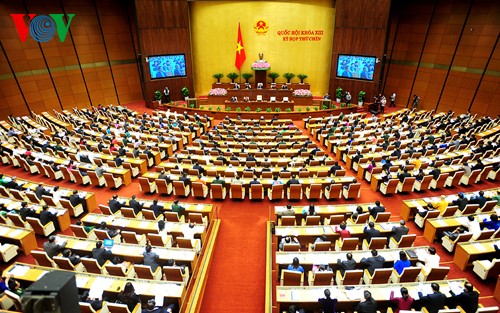(VOVWORLD) - Despite economic instability around the globe, Vietnam has managed to control inflation and stabilize its macro-economy. Vietnam has carried out economic restructuring, reformed its growth model, exploited its potential, and improved productivity, quality, efficiency and competitiveness to create a momentum for further growth next year.
 The 6th session of the 14th National Assembly opened in Hanoi on October 22, 2018 The 6th session of the 14th National Assembly opened in Hanoi on October 22, 2018 |
Vietnam expects to achieve GDP growth of more than 6.7% this year, according to a report delivered by Prime Minister Nguyen Xuan Phuc at the ongoing National Assembly session which opened on Monday. The report says Vietnam’s growth this year was bigger, better and more sustainable than growth during the during 2010-2015 period.
Vietnam will achieve GDP growth of 6.7 % this year
Vietnam’s GDP growth in the past nine months was 6.98%, the highest in 8 years. The industry, agriculture, service, and import-export sectors grew rapidly. Vietnam expects to achieve GDP growth of 6.7% this year and reach all 12 socio-economic targets, surpassing 8 of them. Vietnam’s total economy is expected to increase 1.3 fold, GDP per capita to 440 USD, and overall living conditions to improve. The Prime Minister says Vietnam will achieve all the targets set out in the 5-year plan for 2016 to 2020: “Vietnam’s business environment has improved. 50% of administrative procedures, 61% of business conditions and 60% of import-export inspection procedures have been eliminated. Business costs including capital and administrative procedure costs have been reduced and incentives for business have been implemented. Vietnam is one of the 10 countries with the strongest commitments to reforms, including tax reform. More than 130,000 new enterprises are created every year and the number of new cooperative has also grown, so have enterprises’ revenues and workers’ incomes. Vietnam has implemented many strategic solutions and restructured its economy to realize the Party Resolution on fine-tuning the socialist-oriented market economy, restructuring the state sector, and boosting the private sector.”
The government’s targets for next year are: GDP growth of 6.6% to 6.8%, CPI growth of 4%, export growth of 7 to 8%, import surplus below 3%, and total investment growth of 33-34%,
Efforts will be made to achieve set targets
In his report, Prime Minister Phuc pointed out several weaknesses of the Vietnamese economy and the reasons behind them. He said greater effort should be made to achieve the set targets and stressed the need to accelerate administrative reform, create better conditions for businesses, work out better ways to respond to natural disasters and climate change, strengthen the fight against waste and corruption, and ensure political security and social order. “We must strengthen the macro-economy, control inflation, increase the capacity and self-reliance of the national economy, improve the business environment, and boost economic growth. We need to make practical changes to create strategic breakthroughs, restructure the economy, change the growth model, and increase the productivity, quality, efficiency, and competitiveness of the national economy. It’s important to strengthen innovation and technology, take advantage of the 4th Industrial Revolution, focus on cultural and social development, ensure social security, improve people’s lives, strengthen the management of natural resources and the environment, and respond to natural disasters and climate change.”
The Prime Minister called for stronger reforms in administrative and judicial procedures, streamlining the State apparatus, and strengthening the fight against corruption and stressed the need to strengthen national defense, security, and social order and improve Vietnam’s diplomacy and international integration.